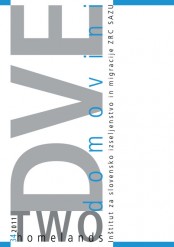Migration, Social Exclusion and Identity Issues of Macedonian Roma
Keywords:
Roma, migration, identity, social exclusionAbstract
The key aspects of issues related to Roma identity are inevitably linked to traditional migration on one hand and the long-term exposure of Roma to discrimination and social exclusion on the other. There- fore, the debate about identity issues, which are also disputable within the framework of the Roma community, would not be feasible without a brief review of the historical patterns of the movement of the Roma, processes of change during the migration waves and preservation of awareness of belonging to a group with specific ethnic and cultural features.
The contemporary analysis of the identity issues of Roma in Macedonia has an ambitious goal: through the application of three approaches used in the research of Roma, to give an overview of the causes and effects of the socio-economic status of Roma, migration and issues related to identity.
Downloads
References
Angelos, James (2010). Wave of Roma Rejected as Asylum Seekers. Spiegel Online International, 26.05.2010. http://www.spiegel.de/international/germany/0,1518,764630,00.html (available on 09.10.2011).
Atkinson, Rob (2000). Combating Social Exclusion in Europe: The New Urban Policy Challenge. Urban Studies, 37(5-6): 1037-1055.
Barany, Zoltan (1998). Ethnic Mobilization and the State: The Roma in Eastern Europe. Ethnic and Racial Studies 21(2): 318-327.
Boswell, Christina (2005). Migration in Europe: A paper prepared for the Policy Analysis and Research Programme of the Global Commission on International Migration. Global Commission on International Migration.
Chiriac, Marian (2007). Brief History of the Roma in Romania. Bucharest: ISI Research and Training Institute.
Commission of the European Communities (2009). The Former Yugoslav Republic of Macedonia: Progress Report, accompanying the Communication From the Commission to the European Parliament and the Council. Enlargement Strategy and main Challenges 2009-2010. Brussels: Commission of the European Communities.
Dedić, Jasminka (2007). Roma and Statelessness. Brussels: European Parliament, Committee on Civil Liberties, Justice and Home Aff airs. Ljubljana: Peace Institute. http://www.europarl.europa.eu/hearings/20070626/libe/dedic_en.pdf (Available on 09.10.2011).
Dević, Ana (2003). Multiculturalism in the Post-Socialist Europe: Between Destruction and Introduction. Paper presented at: What’s the Culture in Multiculturalism-What’s the Diff erence of Identities? Contesting the Future of Equality, Secularism, and National Solidarity, University of Aarhus, Denmark.
Djuric, Rajko and Ljatif Mefaileskoro-Demir (2005). Kratka istorija na Romite. Skopje: Darhia.
Donevska, Maria, et al. (2010) Izvestaj za utvrduvanje na pricinite za predvremeno napustanje na osnovnoto obrazovanie kaj decata Romi. Skopje: OSI Skopje.
Geoff, Payne (2000). An Introduction to Social Divisions. Social Divisions (ed. Geoff Payne). London, Macmillan Press, 1-20.
Gerovska, Maja et al. (2007). Policy Priorities for Social Inclusion in Macedonia. Skopje: Fridrich Ebert Stiftung.
Huntington, Samuel P. (1996). The Clash of Civilizations and the Remaking of World Order. New York: Simon and Schuster.
Jovanovska, Svetlana, et al. (2010). Asylum rise puts Balkan visa-free scheme in danger. Chachipe Press Review: EU Commission asks Serbia and Macedonia to tighten border controls 21.10.10. http:// www.nds-fl uerat.org/wp-content/uploads/2011/05/Chachipe-Press-Review-EU-Commission-asksSerbia-and-Macedonia-to-tighten-border-controls-211010.pdf. (Available on 09.10.2011).
Kenrick, Donald (1971), The World Romani Congress - April 1971. Journal of the Gypsy Lore Society 50, parts 3-4: 101-108
Lakinska, Divna (2000). Vulnerability of Roma Children in the dispersed Roma Communities in Skopje. Skopje: National Center for Training and Social Development.
Lužina, Jelena (2002). Se poznavame li dovolno?: Drugiot vo nastavnite sodrzini na visokoto obrazovanie vo Republika Makedonija. Skopje: FIOM.
Mãrginean, Loan, et al. (2001). Research on the Roma. Bucharest: The Institute for Quality of Life.
McCrone, David (2000). National Identity. Social Divisions (ed. Geoff Payne). London: Macmillan Press, 115-133.
Mefaileskoro-Demir, Ljatif (2002). Roma People in the Macedonian Literture, Music and Film. Skopje: Darhia.
Miniserstvo za trud i socijalna politika (2005). Strategy for Roma in the Republic of Macedonia. Skopje: Miniserstvo za trud i socijalna politika.
Open Society Institute (2008). Equal Access to Quality Education for Roma. Vol. 2, Monitoring report 2007. Budapest: Open Society Institute.
Report on the 2nd European Roma Summit Spanish Presidency of the European Union (2010). Promoting policies in favour of the Roma Population. Held in Cordoba, 08 and 09 April, 2010.
Savich, Carl K. (2010). The Holocaust in Macedonia, 1941-1945. http://www.maticanaiselenici.com/ en/?page=read_news&id=21221. (Available on 10.10.2011).
State Statistical Offi ce (2003). Census Data. Book XIII. Skopje: State Statistical Offi ce.
Trbojevik, Svetlana (2007). Macedonian Civil Society as an Active Promoter of Interethnic Relations. Ethnicity in Eastern Europe: A Challenge for Social Work Education (eds. Darja Zavirsek et al.). Ljubljana: Fakulteta za Socivalno Delo.
UNHCR (2011). The Former Yugoslav Republic of Macedonia: 2011 Regional Operations Profi le - SouthEastern Europe Working Environment. http://www.unhcr.org/pages/49e48d8f6.html. (Available on 11.10. 2011).
Vermeulen, Hans and Boris Slijper (2000). Multiculturalism and Culturalism: A Social Scientifi c Critique of the Political Philosophy of Multiculturalism. Paper presented at the Second Euro Conference Democracy Beyond the Nation-State: Perspectives on a post-National Order, 5-7 October 2000, Athens.
Vukanovic, Tatomir (1983). Romi (Cigani) u Jugoslaviji. Vranje: Nova Jugoslavija.
Yuval-Davis, Nira and Floya Anthias (1992). Racialized Boundaries: Race, Nation, Gender, Color and Class and the Anti Racist Struggle. London: Routledge.
Downloads
Published
How to Cite
Issue
Section
License

This work is licensed under a Creative Commons Attribution-NonCommercial-NoDerivatives 4.0 International License.
Authors guarantee that the work is their own original creation and does not infringe any statutory or common-law copyright or any proprietary right of any third party. In case of claims by third parties, authors commit their self to defend the interests of the publisher, and shall cover any potential costs.
More in: Submission chapter





